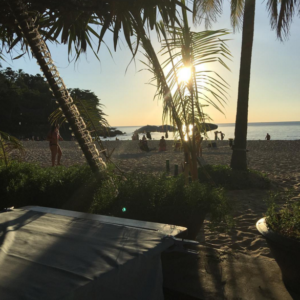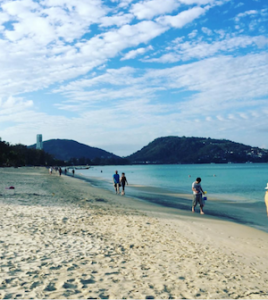I just spent a month in Thailand traveling around, working, meeting cool people, and visiting some breathtaking islands.
As a workaholic entrepreneur, I never considered the possibility of traveling while working and the idea of traveling alone to a foreign country, where I didn’t speak the language, was even more scary!
But, I’m here to tell you that it’s possible. You can work from your laptop while you travel the world and you can certainly grow a business at the same time.
While I traveled, my business functioned normally. I can teach you to set up the same kind of online business.
There are definitely some hacks that you should know and things that you should be aware of before taking the leap. This post is the post I wish I had read before traveling to Thailand. Hope it’s helpful!
1. Consider subletting your current apartment
If you already have an apartment with a yearlong lease, you might be able to sublet your apartment for a few months while you’re traveling (depending on the agreement, of course).
Subletting is very common in New York City, where I’m based, and it can be a great way to supplement your income while abroad. It will also take care of the fixed cost of your apartment and make it easier financially.
If you want to try out the digital nomad lifestyle, subletting can also be an easy way to create a safety net so that you’re not spending too much money while you’re in another country.
2. Have a definite income source
I don’t think it’s a good idea to leave home, unless you have a predefined income stream and a business with real revenue and profit. Otherwise, you’ll just be drawing from your savings.
But, if you’re willing to live abroad and abandon your apartment in the USA, there are locations that you can live with a super low cost of living, which will be helpful when you’re just starting to build your business. You’ll just be using your savings until you generate revenue.
For example, Chiang Mai in Thailand is a frequent location for digital entrepreneurs looking to take advantage of currency differences and the cheap living costs in Thailand (here are some reasons to consider Chiang Mai).
I’ve written about this a lot in the past, but the quickest way to develop a location independent income source is by offering freelancing or consulting services. You can start a business around these services part-time while you’re at your job (more business ideas).
3. Pre-schedule as much work as you can
This assumes that you already have a business that’s up and running. You need to systematize all of the efforts that go into generating your primary revenue sources.
For me, I pre-scheduled blog posts and podcasts for the entire month that I was in Thailand. I also prioritized and decided on the action items that I could ignore on a daily basis and that I’d only check up on weekly.
Not only does pre-scheduling take a lot of headache and worry out of the equation while you’re traveling, but it also has the added benefit of freeing up time, so that you can work on other things while you’re abroad.
If you have a very service-oriented business, then you might want to consider hiring a virtual assistant or capable freelancer who can help you increase your work output. In this way, you’ll become more of a manager and you can pre-schedule tasks for your worker.
There are lots of marketplaces out there to hire a virtual assistant, like:
4. Establish a home base.
This was a very important part of my trip. Rather than trying to plan out a bunch of stuff that I wanted to do before I had left for Thailand, I blocked off 3 weeks in Patong and 1 week in Bangkok.
I put my effort into establishing a lifestyle in these cities rather than plotting out a bunch of adventures before I got there. I spend the first two days figuring out:
- Where to do laundry
- Cheap places to eat regularly
- Different places I could travel from that location.
- Where I could get the best internet.
- A gym where I could workout.
Once I had this set, I then felt more comfortable taking day trips. Having these home bases allowed me to be more consistent with my work, because I wasn’t thinking about a million things like where I was going to spend the night the next day or how I was going to get from point A to point B.
5. Decide on what kind of trip you want
So many blogs out there advised that I go to Chiang Mai or a low-key part of Thailand. Personally, I didn’t care for that kind of lifestyle. I wanted to be at the center of the party and be able to go to live music and dancing locations!
I also knew that I wanted to be by a beach, because it was super cold in new york city at that time of the year.
By simply making note of the items that I cared about and didn’t care about, it was easier to narrow down where I wanted to go in the world and which place would give me the most happiness for the time that I was there.
Write down the items that are important to you for the trip and the level of their importance. This will help you decide on which region of the world you want to go and the best time to go there.
6. Figure out where you want to go
There were actually a surprising number of resources online for traveling entrepreneurs. I’ll list out a few that I found helpful below.
I didn’t find Meetup groups to be helpful at all when abroad, but there were a lot of nomad forums online where you can meet people in your target country.
There are a few things to take into account when deciding where you want to travel:
- Internet speed
- Use of mobile phone
- Availability of day trips
- Safety (obviously)
- How you’ll get around or if everything is in one location
I was able to use my mobile phone very easily in Thailand with a local sim card and data package. My internet speed was not as nice as in the USA, but it served its purpose and I could watch videos.
I got around mainly with taxis and occasionally a motor bike. In Bangkok, I used the BTS (like a subway) and taxis.
7. Set up safety nets
I can’t say this loud enough. Set up safety nets! You’re going to be on the other side of the world. What if something bad happens?
What if your passport is stolen? What if your wallet is stolen? What if your laptop dies?
Plan for these unexpected events before they happen!
I made sure to use my room safe at all times, kept spare change, a backup passport photocopy and photos, and made sure that everyone in my area (like my landlord) knew my name and face in case I ever got locked out.
I also backed up my laptop, copied crucial data from my phone, used a waterproof case for my phone when I went into the water, and purchased emergency travel insurance so that I could get back to the USA if I had some kind of medical accident.
I was always very aware of my surroundings, where the exits were for any place I went in, and didn’t engage in any conversations where I was interrupted by a local on the street, asking me a question or offering something.
8. Figure out how to meet people
Not gonna lie, you’re probably going to have to put on your outgoing personality if you want to meet people while abroad.
It’s true, there are some traveling groups online and Facebook groups that you can check out (example), but you can make a lot of friends just by being friendly and approachable.
While in Bangkok, I had people buy me drinks and ask about America who were from the UK and other nations. But that’s because I put on my outgoing personality and made a funny remark or observation as a catalyst to the conversation.
In Phuket, I used every conversation and interaction as an opportunity to socialize, even if it was just over the best places to go in the area or where to eat. There were also a lot of travelers around my AirBnB who went to cafes that were open to conversation.
If I had to break it down to a step-by-step process, it would be:
- Like fishing, throw out a bunch of lines. You could make a joke, an observation, or ask someone a question.
- See which lines have a nibble or a bite. Who is open to having a conversation? Not everyone will be. Also, not everyone will be in the area for a long period of time.
- Get their contact information.
You should always be positive, upbeat, and relaxed. That’s the type of person that other people want to be around.
Lastly, I’ll say that you should be very conscious of your body language, particularly if you want to make friends with local people. A smile, eye contact, and confident body language goes farther than simple spoken language. I had some great random nights just from striking up conversations and made new friends!
9. Don’t forget emergency savings
I know you don’t want to hear this, but you really do need a cushion of savings that you can fall back on. I would recommend at least one month of local expenses.
The goal isn’t to draw from these savings, but to only use them if needed.
10. Can you set up a new business while traveling?
For those of you that haven’t set up an online business yet and you’re wondering if you could start a business while you’re traveling, here’s my answer: It will be very difficult.
I think it’s doable to set up a traditional lifestyle business (like these) while you’re traveling and grow that business while abroad. I would learn as much as possible before you leave about the skills that you’re going to need to accomplish that goal like SEO, copywriting, product creation, etc.
A lot of business is trial and error, so I’d give yourself a year to set up the business and generate some healthy revenue, assuming that you’re working on it consistently and learning from your mistakes.
If you’re trying to launch a tech startup while traveling abroad, I don’t think it’s doable. A tech startup is a very different beast from a lifestyle business and requires many more hours, constant attention, and teamwork.
That’s not to say that there probably isn’t someone out there who’s done it. I just think that it’s making the task much harder, particularity with timezones and teammates.






